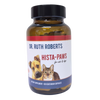Acupuncture is a holistic approach to healing that has been practiced for centuries. This ancient therapy, rooted in traditional Chinese medicine (TCM), involves the insertion of thin needles into specific points on the body to stimulate energy flow, commonly referred to as "chi" or "qi." This holistic approach aims to balance the body's energy, promoting overall wellbeing rather than just alleviating specific symptoms.
Acupuncture's core principle is to address the root causes of health imbalances, rather than merely treating the surface symptoms. By stimulating specific points on the body, it seeks to harmonize the body's vital energy, ultimately helping it function optimally. This holistic perspective recognizes the inter-connectedness of various bodily systems and strives to maintain equilibrium among them.
Acupuncture in Animal Health: Traditional Chinese Veterinary Medicine

Traditional Chinese Veterinary Medicine (TCVM) is a comprehensive and ancient approach to animal health care that encompasses various therapeutic modalities, with acupuncture being one of its core components. TCVM is based on principles similar to those of Traditional Chinese Medicine for humans, focusing on balancing the vital energy or "qi" within the body.
In TCVM, the body is seen as an interconnected system where imbalances in one area can affect the entire organism. The practice aims to harmonize and restore the flow of qi to promote health and wellbeing. TCVM incorporates acupuncture, herbal medicine, food therapy, and other holistic techniques to address a wide range of pet conditions.
A Wide Range of Pet Conditions Treated
Acupuncture, as a vital part of TCVM, offers a holistic and natural approach to treating various health issues in animals. This ancient therapy has been adapted and refined for use in veterinary medicine, providing numerous benefits to our furry and feathered friends.
One of the remarkable aspects of acupuncture in animal health is its versatility. It can be used to address a wide array of pet conditions, including but not limited to:
- Musculoskeletal Issues: Acupuncture is highly effective in managing musculoskeletal problems such as arthritis, back pain, and lameness. By stimulating specific points, it helps reduce inflammation, alleviate pain, and improve mobility.
- Digestive Problems: Pets suffering from digestive issues like vomiting, diarrhea, and constipation can find relief through acupuncture. It can help regulate gastrointestinal function and restore balance to the digestive system.
- Respiratory Issues: Acupuncture is used to manage respiratory conditions like allergies and bronchitis in animals. It can help alleviate symptoms and improve breathing.
- Skin Conditions and Allergies: Skin problems and allergies can be challenging for pets. Acupuncture can assist in reducing itching, inflammation, and discomfort associated with these conditions.
- Nervous System Disorders: Pets with nervous system disorders such as seizures and paralysis may benefit from acupuncture. It can help improve nerve function and promote recovery.
- Behavioral Problems: Acupuncture can also play a role in managing behavioral issues like anxiety and aggression. By promoting relaxation and reducing stress, it can contribute to better behavior.
- Pain and other symptoms associated with cancer and chemotherapy
Acupuncture is particularly valuable in cases where traditional treatments may have limitations or side effects. It offers a non-invasive and drug-free option for pet owners who seek holistic and comprehensive care for their animal companions.
The Benefits of Acupuncture in Pet Care
Acupuncture offers a multitude of benefits when it comes to enhancing the health and wellbeing of our beloved pets. In this section, we'll delve into some of the key advantages that make acupuncture a preferred choice for many pet owners.
Non-Invasive and Well-Tolerated

One of the primary benefits of acupuncture for pets is that it is non-invasive and well-tolerated. Unlike surgical procedures or certain medications that can be stressful and uncomfortable for animals, acupuncture involves the gentle insertion of thin needles into specific points on the body. This minimally invasive approach typically causes little to no discomfort for the pet. Most animals relax during acupuncture sessions, and some even find it soothing, often falling asleep during treatment.
Help Reduce Drug Dosages for Your Pet with Chronic Diseases
Acupuncture serves as a potent pain management method for pets experiencing discomfort. Many animals dealing with liver or kidney issues find it challenging to rely on conventional pain relief methods. Even for those who can, there may be side effects or intolerance to pain medications. For pet owners seeking to reduce their furry friend's reliance on pain medication while still providing relief, acupuncture can offer a solution.
While acupuncture cannot guarantee the complete cure of a disease, it serves as an incredible tool to support your pet's well-being. This is because it not only addresses disease symptoms but also works to alleviate the underlying causes, such as inflammation resulting from damage.
Complementary to Conventional Veterinary Care

Acupuncture seamlessly integrates with conventional veterinary care, making it a valuable complementary therapy. It does not replace traditional treatments but works alongside them to enhance the overall healthcare of the pet. This collaborative approach ensures that the pet receives a comprehensive and holistic treatment plan that addresses both the symptoms and underlying causes of health issues. By combining acupuncture with standard veterinary practices, pet owners can provide their furry friends with a well-rounded and balanced healthcare regimen.
A Holistic Healthcare Approach
Acupuncture epitomizes a holistic healthcare approach, focusing on the interconnectedness of the body and the importance of balance and harmony. Instead of merely treating symptoms, acupuncture delves into the root causes of imbalances within the pet's body. It aims to restore equilibrium by promoting the flow of vital energy (qi) and improving the function of various systems. This holistic perspective emphasizes not only the resolution of specific health issues but also the overall health and vitality of the pet. By addressing physical, emotional, and energetic aspects, acupuncture strives to create a state of wellbeing that goes beyond the absence of disease.
Acupuncture Response Between Dogs and Cats
When it comes to acupuncture for dogs and cats, the basic principles are similar, but there are some differences in how they respond. Here are a few things to keep in mind:

Needle Sensitivity: Cats are generally more touch-sensitive and may react more to acupuncture needle insertion. It's important to use a gentle and patient approach to ensure their comfort. On the other hand, dogs typically handle needle insertion better, although individual dogs may vary in their sensitivity.
Size and Skin Thickness: Dogs usually have larger bodies and thicker skin compared to cats. This can affect how deep the needles need to be inserted and the specific points chosen for treatment. Cats, with their smaller and more delicate body structure, require a gentler approach to needle insertion.
Treatment Duration: Cats may need shorter acupuncture sessions compared to dogs because they may have a lower tolerance for prolonged treatments.
Handling Stress: Cats are generally more prone to stress in unfamiliar environments. Therefore, creating a calm and comfortable setting is crucial for successful acupuncture sessions in cats. Dogs, being more adaptable to new environments, may handle stress differently.
Response to Treatment: Individual responses to acupuncture can vary widely in both dogs and cats. Some pets may respond positively to treatment. Monitoring each pet's response and adjusting the treatment plan accordingly is essential.
How Much is Acupuncture for Dogs and Cats?
The cost of acupuncture for pets can vary depending on several factors that pet owners should keep in mind. One major factor is the location, where costs are generally higher in metropolitan areas compared to rural regions. The experience and specialization of the veterinarian also play a role, as more experienced practitioners may charge higher fees. The overall cost is affected by the number of sessions needed for the treatment plan, with estimated prices ranging from $80 to $150 for a single session and $200 to $800 for a comprehensive plan of 4-6 sessions. Additionally, some clinics may provide extra services such as herbal remedies or massage therapy, potentially adding to the overall cost.

When comparing costs, it's important to note that the cost of acupuncture for dogs falls within a similar price range as acupuncture for humans, depending on the location and expertise of the practitioner. However, acupuncture for cats tends to be slightly more affordable than for dogs due to smaller needles and shorter treatment sessions, with costs ranging from $40 to $100 per session or $150 to $600 for a treatment plan. Before you decide on acupuncture for your furry friend, check if your pet insurance covers it. It's also a good idea to get quotes from different vets to compare prices. While cost is important, remember that acupuncture can be a great way to treat many dog and cat problems, so weigh the pros and cons before making a decision
How Do I Get My Pet Started?
If your pet’s regular veterinarian is also a certified animal acupuncturist, you’re all set! He/she will perform all necessary exams to determine what treatments are best for your furball, and may even get started right away.
If you’re not already in with a small animal acupuncturist, never fear. Many traditional veterinarians are now recognizing acupuncture as a successful complementary therapy to their treatments. There’s a good chance your vet will give the green light for acupuncture, especially if they’ve hit a roadblock in treatment.
Because acupuncture for pets is becoming more widely accepted in the veterinary community, an acupuncturist may not be far. Resources like this one from the Chi Institute can help you find a veterinary acupuncturist near you.
Conclusion
Acupuncture, with its age-old wisdom, can be a great way to help your furry friend feel better naturally. But just sticking needles in a few spots isn't enough for true health. Lots of things need to be in balance for your pet to be their best, and acupuncture is just one piece of the puzzle. Exercise, the dynamic interplay of muscles and movement, holds a vital position in maintaining this balance. Regular walks, playful activities, and gentle stretches act as sources of vitality, ensuring that your pet's energy flows freely. A well-exercised body reflects health and joy.
However, the complete harmony of wellness requires more than just acupuncture. It also involves providing a well-rounded diet. Exploring holistic therapies, such as acupuncture, contributes to your pet's health, but the foundation of this balance lies in the daily practice of offering nutritious and balanced meals. Here another tool using the principles of functional medicine steps in. Made with nature's finest ingredients, The Original CrockPet Diet is a carefully crafted recipe for pet well-being. Each bite delivers essential nutrients, nurturing your furry friend from the inside out, not just their body but their entire being. The Original CrockPet Diet as a functional medicine-based food option that nourishes your pet from within, further amplifying the benefits of acupuncture and exercise.
















